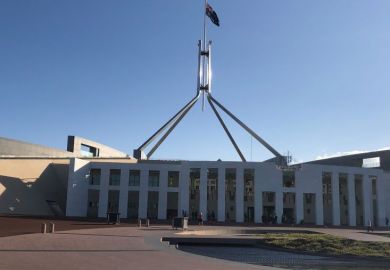Australia’s government is yet to confirm whether it will repeal a directive to slow down student visa processing, despite describing proposed international enrolment caps as a replacement mechanism.
Education minister Jason Clare told the Australian Financial Review Higher Education conference that the caps were designed to replace ministerial direction 107, which was issued last December by former home affairs minister Clare O’Neil. Mr Clare said enrolment quotas would be a better and fairer mechanism.
Times Higher Education asked new home affairs minister Tony Burke’s office whether he intended to repeal his predecessor’s directive.
His department said that if the legislation to establish the caps passed parliament, Mr Burke would “work closely” with the education minister “to ensure that guidance to the department on its processing priorities is provided in a way that best supports effective implementation” of the caps.
Mr Clare’s office said more details would be forthcoming next week.
Ministerial direction 107 is a triaging mechanism for processing student visa applications. It requires officials to prioritise visas for students enrolled with universities or colleges rated as having low immigration risk, before considering applications from people bound for medium-risk and finally high-risk institutions.
Previously, risk ratings influenced the amount of paperwork required from applicants but not the order in which their visas were processed.
The change has disadvantaged the bulk of the sector. Most universities now carry unfavourable risk ratings, partly because immigration officials have escalated their rejections of visa applications. Visa refusals are among the metrics that contribute to the risk ratings.
Just 16 of Australia’s 42 universities now have low-risk ratings, down from 25 earlier this year. The number rated medium risk increased from 16 to 23, with another three now considered high risk.
University administrators say ministerial direction 107 will cost the sector A$500 million (£260 million) this year alone, with individual institutions estimating that the flow-on effects will set them back by as much as A$100 million.
Shadow education minister Sarah Henderson told the AFR conference that the directive had caused “blatant discrimination against regional and smaller universities and private higher education providers”, with some institutions now at risk of collapse.
Migration expert Abul Rizvi, a former high-ranking bureaucrat, questioned how the directive could be completely jettisoned. “There hasn’t been a year that I can remember since 1991 that we haven’t had a risk rating system for processing overseas students. I don’t see that being abolished quickly.”
Dr Rizvi said risk ratings should be applied to nationalities and education levels, but not students’ intended institutions.
He criticised a “worrying” lack of coordination between federal agencies. “Home Affairs…owns ministerial direction 107, not Mr Clare’s department,” he noted.
Meanwhile, the government says it has shut down more than 150 “ghost colleges” and put another 140 on notice, in a crackdown on “dormant” training institutions.
The vocational education and training (VET) regulator Asqa took the action after an amendment to its legislation in March enabled it to deregister institutions that pretended to educate students who were really in Australia to work.
Skills minister Andrew Giles said the government was “calling time on the rorts and loopholes that have plagued the VET sector for far too long”. He said the 140 institutions that had been “given a yellow card” would have to resume satisfactory training by the end of the year or face deregistration.
Register to continue
Why register?
- Registration is free and only takes a moment
- Once registered, you can read 3 articles a month
- Sign up for our newsletter
Subscribe
Or subscribe for unlimited access to:
- Unlimited access to news, views, insights & reviews
- Digital editions
- Digital access to THE’s university and college rankings analysis
Already registered or a current subscriber?








